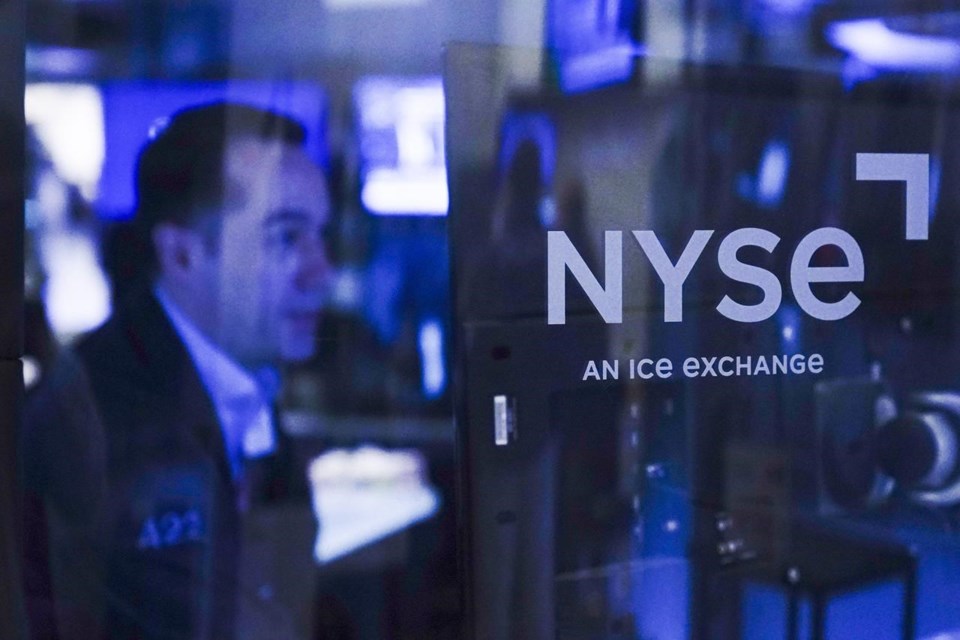NEW YORK (AP) — U.S. stocks slipped as the clamps tightened on Wall Street from rising yields in the bond market. The S&P 500 fell 0.6% Thursday, breaking a four-day winning streak. The Dow lost 173 points, and the Nasdaq composite gave back 0.6%. A weak auction for long-term Treasury bonds drove yields up across the bond market. Yields had already been climbing following a report showing inflation was a touch higher last month than expected. Higher yields can knock down stock prices, all else equal. Oil prices eased after zigzagging through the day.
THIS IS A BREAKING NEWS UPDATE. AP’s earlier story follows below.
NEW YORK (AP) — U.S. stocks are slipping Thursday as the clamps tighten on Wall Street from rising yields in the bond market.
The S&P 500 was 0.7% lower in afternoon trading and on track to break a four-day winning streak, its longest since August.
The Dow Jones Industrial Average was down 204 points, or 0.6%, as of 3 pm. Eastern time, and the Nasdaq composite was 0.8% lower.
The stock market has largely been taking its cue from the bond market recently, and weak results announced in the afternoon for an auction of 30-year Treasury bonds sent yields of all kinds of Treasurys higher. Higher yields can knock down prices for stocks, all else equal, and slow the economy by making borrowing more expensive.
Yields had already been on the rise in the morning following a report that showed inflation at the consumer level was a touch higher last month than economists expected. That raises worries about the Federal Reserve keeping its main interest rate high for a long time, as it tries to undercut inflation by knocking down investment prices and slowing the economy.
The inflation report, though, also had some encouraging nuggets for financial markets underneath the surface. After ignoring prices for food and fuel, which Fed officials see as a better predictor of where inflation is heading, prices that consumers had to pay last month were in line with expectations. They also continued to decelerate from earlier months.
A second economic report from the morning likewise offered both encouragement and caution for financial markets. It said slightly fewer U.S. workers applied for unemployment benefits last week than expected. On one hand, it indicates a job market with few layoffs, which means strength for the overall economy. But it could also be adding fuel to keep upward pressure on inflation.
Following the reports, the 10-year Treasury yield rose to 4.70% from 4.56% late Wednesday. The two-year Treasury yield, which more closely tracks expectations for the Fed, climbed to 5.06% from 4.99%.
Yields are still down slightly for the week so far. After jumping last week to their highest levels in more than a decade, yields regressed following speeches that investors saw as hints that the Fed may not hike its main overnight interest rate anymore.
The big jump for the 10-year Treasury yield since the summer has pulled mortgage rates to their highest levels since the turn of the millennium, and such moves could slow the economy without requiring more hikes by the Fed.
Nothing in Thursday’s inflation report should sway the Fed one way or the other when it comes to what it will do on Nov. 1, when it announces its next move on interest rates, said Seema Shah, chief global strategist at Principal Asset Management. She called the data “reassuringly uneventful.”
“The question around whether or not there will be one more interest rate hike is yet to be answered,” she said.
Rising crude oil prices have put extra pressure on inflation since the summer, and they were volatile again Thursday. After jumping early in the day, a barrel of benchmark U.S. crude slipped 58 cents to settle at $82.91. Brent crude, the international standard, rose 18 cents to $86 per barrel.
After jumping since the summer and then regressing a couple weeks ago, crude prices have been shaky following the latest fighting in Gaza. The worry is the violence could lead to disruptions in the supply of petroleum.
Higher oil prices add costs across the economy, and airlines are particularly hurt because fuel is one of their biggest expenses.
Delta Air Lines fell 2.3% lower despite reporting stronger profit for the summer than analysts expected. It also said it’s seeing encouraging trends for bookings going into the holiday season.
It’s at the head of a reporting season for S&P 500 companies that could mark a return to profit growth following three straight quarters of declines.
Several financial giants will report on Friday, including Citigroup, JPMorgan Chase and Wells Fargo, along with UnitedHealth Group.
Ford Motor slumped 1.9% after the United Auto Workers union significantly escalated its walkout against Detroit automakers. In a surprise move, 8,700 workers left their jobs at a Ford truck plant in Louisville, Kentucky.
In stock markets abroad, indexes were mixed in Europe after rising sharply in much of Asia.
___
AP Business Writer Yuri Kageyama contributed.
Stan Choe, The Associated Press



